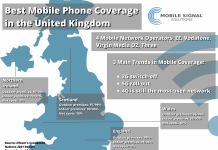
Mobile phone networks have advanced hugely in the last decade. The speeds at which data can be downloaded on 4G/5G devices can rival broadband speeds. This increase in speed allows your mobile device to not only make voice calls, but with the use of the device’s camera you can make video calls or even video conference calls without the need for a broadband connection. However, in many modern day offices, hospitals, warehouses, and many other areas the public are still struggling to make basic voice calls. Turning to Wifi calling may seem like a good solution but does it help?
Building materials used in the UK like concrete and steel can stop the mobile signal from penetrating the building, essentially turning your building into a Faraday cage for mobile signals. The signal passes around the building and cannot easily penetrate to the inside. In smaller buildings it isn’t usually an issue, but in larger buildings and buildings with thick walls, the signal loss can be significant. To overcome this, many companies have opened up their wifi network for staff to utilise WIFI calling.
What is WIFI calling?
WiFi calling is a feature that enables you to make phone calls and send text messages via a wireless internet connection, rather than using your cellular carrier network. You can make WiFi calls via your home internet or WiFi hotspots when you’re on the go, even if you aren’t near a local cell tower.
Does Wifi Calling work in the UK?
There are many things to consider when trying to decide if wifi calling is for you.
If you are a business that relies on clear crisp phone calls, then having access to the local cell tower for reliability is a must. With wifi calling so much could go wrong if you are closing a deal or contract with a client.
The wifi signal strength may not be good enough, there is too much latency, or contention on the network. At peak times of the day the network may become overcrowded. For example In hotels, airports, universities, stadiums, and other crowded venues, WiFi connections can lag, resulting in poor voice call quality and dropped calls.
Some devices don’t support WiFi calling. You must have a smartphone or mobile device with built-in WiFi calling capabilities.
Data usage fees could possibly apply in some circumstances. When you aren’t using your home or office internet connection for WiFi calling, you may be subject to access fees or unexpected charges if you lose your WiFi connection and a call defaults to your data plan.
Advantages of Wifi Calling in the UK
- Seamless Coverage: Wi-Fi calling enables your phone to switch seamlessly to a Wi-Fi network in areas where cellular signal is weak or unavailable, ensuring you stay connected without manually searching for better coverage.
- Cost-Efficiency & Simple Setup: This feature is not only affordable (often free with your mobile plan) but also incredibly easy to activate in your phone’s settings, offering significant savings especially on international calls without needing extra hardware or apps. Keep in mind not all phones have this feature, so it won’t be available to everyone.
- Battery Life Optimisation: In areas of low cellular coverage, phones typically drain battery faster while searching for a signal. Wi-Fi calling alleviates this by using available Wi-Fi networks, helping preserve battery life. However if you need to keep Wifi calling on all of the time, then it could potentially cause your phone to drain battery faster.
Disadvantages of Wifi Calling in the UK
- Missing Important Calls: Imagine waiting for a very important call and never realising it came through because your phone didn’t ring. This can happen with Wi-Fi calling if your internet isn’t steady. For businesses, missing a call can mean losing a customer or an important deal, which is a big deal if you’re trying to grow or maintain your reputation.
- Depends on Good Internet: If you’ve ever tried to watch a video or load a website on public Wi-Fi, you know how slow and frustrating it can be when lots of people are trying to do the same thing. Wi-Fi calling has the same problem. When lots of folks are using the same Wi-Fi, your call quality could drop, making it hard to hear the person you’re talking to or even causing the call to drop completely.
- Security and Emergencies: Using Wi-Fi calling, especially on public Wi-Fi, can be a bit risky because these networks aren’t always secure. It’s like leaving your front door unlocked; you never know who might sneak in. Plus, if you need to call for help in an emergency, Wi-Fi calling might not tell the emergency services exactly where you are, which could delay them getting to you. This is especially worrying if you’re not sure of your location or if there’s a real emergency and every second counts.
- Texts and International Calls Can Be Tricky: Even though making calls over Wi-Fi can be super convenient, sending texts or making international calls might not work as well. Some people find they don’t get texts until much later, which isn’t great if you’re waiting for something like a security or bank code. Also, if you’re calling someone in another country, your mobile company might still charge you extra, which seems a bit unfair when the idea was to save money.
- Not Everyone Can Use It: Not all phones and mobile companies work with Wi-Fi calling. This means if your phone is a bit older or you’re with a smaller mobile company, you might not be able to use Wi-Fi calling at all. It can be annoying if you’re in an area with bad mobile signal and could really do with Wi-Fi calling to stay in touch.
Cellular calling negates many of the flaws that Wifi calling has. Cellular networks have a larger capacity meaning that they can have more active users at a time than wifi networks. They also have a much larger coverage area which also means that you would have to install less units than you would with a wifi connection. Cellular networks are also more flexible and private than wifi. If you are struggling with your network signal and need a solution, Mobile Signal Solutions offers full bespoke installations for commercial properties across the UK.




